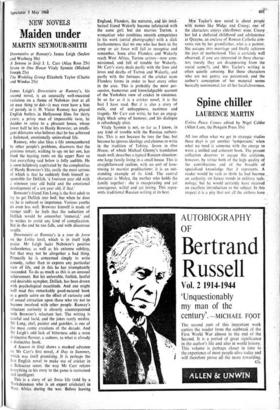NEW NOVELS
• Maiden under MARTIN SEYMOUR-SMITH
A Season in Sing J. L. Carr (Alan Ross 25s) Seven in One House Vitaly Syomin (Michael Joseph 25s) The Wedding Group Elizabeth Taylor (Chatto and VVindus 25s) James Leigh's Downstairs at Ramsey's, his second novel, is an unusually well-executed variation on a theme of Nabokov (not at all an easy thing to do)—it may even have a hint of parody in it. H. Victor Ramsey has played English butlers in Hollywood films for thirty years; a prissy man of impeccable taste, he decides to retire to a pleasant house, whose lower half he lets to Hardy Brewster, an intelli- gent dilettante who believes that he has achiev,ed a balanced, emotionally uninvolved life.
Ramsey, who also likes a life unencumbered by other people's problems, discovers that the previous tenant, wishing to spy on her son, has fixed the heating vents on the upper floor so that everything said below is fully audible. He is soonitelplessly captivated by the complexities of Hardy Brewster's life, easily the most serious of which is that he suddenly finds himself re- sponsible for Delilah, `i fourteen year old with . a nineteen year old build and the emotional development of a ten year old, if that.'
Brewster's friend Jim Long is the first adult to try to get Delilah into bed; but when he does so, he is reduced to impotence. Various youths do even less well. Brewster himself is made of sterner stuff: he feels that the seduction of Delilah would be somewhat 'immoral,' and he wishes to avoid any kind of complication. But in the end he too falls, and with disastrous results.
Downstairs at Ramsey's is a tour de force on the Lolita level, which is in itself high praise. Mr Leigh lacks Nabokov's positive malevolence, as well as his extreme subtlety, but that may not be altogether a bad thing. Primarily he is concerned simply to write comedy, ,rather than to express any particular view of life, and in this he has triumphantly succeeded. To do as much as this is an unusual achievement. But his unlovable, foolish, lustful and desirable nymphet, Delilah, has been drawn with psychological exactitude. And one might well read this remarkably good-natured book as a gentle satire on the effect of curiosity and of sexual attraction upon those who try not to become involved with other people. Ramsey's reluctant curiosity is cleverly counterpointed with Brewster's reluctant lust. The writing is careful and lucid, and the jokes rarely misfire. Mr Long, chef, painter and gambler, is one of the most comic creations of the decade. And Mr Leigh's odd lack of bitterness adds a most distinctive flavour, a sadness, to what is already a distinctive book.
A Season in Sinji shows a marked advance on Mr Carr's first novel, A Day in Summer, Which was itself promising., It is perhaps the first English novel to make use of cricket in a Balzacian sense; the way Mr Carr relates everything in his story to the game is restrained and intelligent.
This is a story of air force life (told by a Yorkshireman who is an expert cricketer) in West Africa during the war. Before leaving England, Flanders, the narrator, and his interlectual friend Wakerly become infatuated with the same girl; but she marries Turton, a womaniser who combines smooth competence in his work (aerial photography) with a slick loathsomeness that no one who has been in the army or air force will fail to recognise and remember. Soon after Flanders and Wakerly reach West Africa, Turton arrives—now corn- missioned, and full of trouble for Wakerly. Mr Carr's story deals partly with the lives and loves and deaths of Turton and Wakerly, and partly with the fortunes of the cricket team Flanders forms in order to beat every other in the area. This is probably the most per- suasive, humorous and knowledgeable account of the Yorkshire view of cricket in existence. In so far as it is a cricket novel, it is the best I have read. But it is also a story of exile, and of unhappiness, nastiness and tragedy. Mr Carr can write, he has an engag- ingly black sense of humour, and his dialogue is refreshingly alive.
Vitaly Syomin is not, so far as I know, in any kind of trouble with the Russian authori- ties. This is not because he toes the line, but because he ignores ideology and chooses to write in the tradition of Tolstoy. Seven in One House, of which Michael Glenny's translation reads well, describes a typical Russian situation: one large family living in a small house. This is straightforward realism, with no sort of kow- towing to marxist predilections; it is an out- standing example of its kind. The central charaCter is Mulya, the mother who holds the family together: she is exasperating and yet courageous, wilful and yet loving. This repre- sents traditional Russian writing at its best.
Mrs. Taylor's new novel is about people' with names like Midge and Cressy; one Of the characters enjoys elderfloiver wine. Cressy, , has led a sheltered childhood and adolescence'. at QuaYne, an enclave of Roman Catholic Con- vents run by her grandfather, who is a painter. She escapes into marriage and finally achieves the joys of motherhood. This is certainly well observed, if you are interested in these charac- ters (surely they are disappearing from the social scene?), and Mrs Taylor's writing is often quietly amusing. But those characters who are not gentry are patronised, and the author's conception of her material seems basically sentimental, for all her local cleverness.






































 Previous page
Previous page